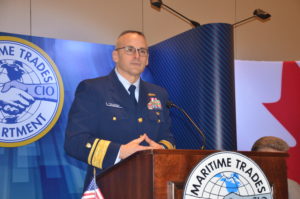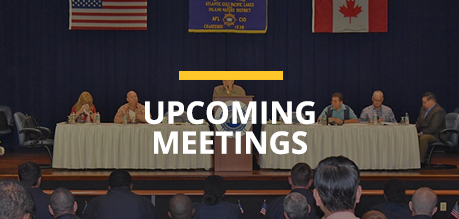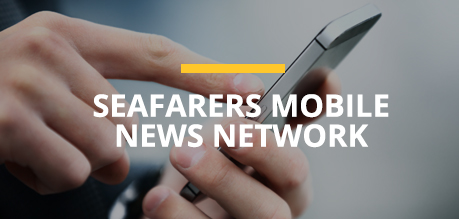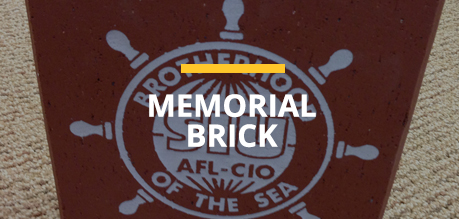The following statement was issued by the U.S. Coast Guard on May 22:
From the desk of Rear Adm. John Nadeau, assistant commandant for prevention policy

Rear Admiral John Nadeau, the U.S. Coast Guard’s Assistant Commandant for Prevention Policy, pictured during the 2019 MTD executive board meetings.
Today is ‘National Maritime Day’ as declared by Congress in 1933 to commemorate the first transoceanic voyage by a steamship in 1819 by the S.S. Savannah.
More than 85 years after the declaration, National Maritime Day has evolved into an opportunity to honor the mariner and reflect on the impact you, our merchant mariners and entire maritime workforce, have on our great country. It is an honor that Coast Guard members strive to observe each day in all that we do – with every search and rescue case, every vessel inspection and facility exam, every ATON survey and casualty investigation, and every other operation and service we deliver.
The Coast Guard is responsible for the safety and resiliency of our ports and waterways, but we cannot be successful without the cooperation and support of professional mariners in the U.S. and around the world. From deck hands, pilots, and masters, to engineers, port workers, and maritime executives at all levels, you are an essential part of the sophisticated and intricate network that powers the U.S. Marine Transportation System.
The last 12 months brought significant milestones that honor mariners and are worth noting today. In October, we published the first ever Maritime Commerce Strategic Outlook, which outlines the Commandant’s long term vision to safeguard the MTS and support maritime commerce in the United States. We are committed to implementing this strategic outlook and providing for the safety, security, and stewardship of our MTS, and the $5.4 trillion of annual economic activity and 30.8 million jobs the MTS brings to the United States.
Second, the Final Rule for Seafarer’s Access to Maritime Facilities was published in April to ensure mariners, pilots, and representatives of seamen’s welfare and labor organizations have access between vessels moored at a facility and the facility gate, in a timely manner and at no cost to the mariner. This important regulation will allow mariners to pass through terminals for some much-needed shore leave, improve mariners’ overall quality of life, and help them get the support they deserve.
Whether a state-licensed pilot, commercial fishing vessel crewman or a cruise ship captain, a water taxi skipper or offshore supply worker, a towboat mate, engineer or a container ship crane operator, the U.S. mariner is entrusted with the safety of passengers and crew and keeps our economy flowing every day.
Today, we salute and thank you for your dedicated service and commitment to keep our vessels, ports and waterways safe, secure, prosperous, and resilient.
# # #





Comments are closed.